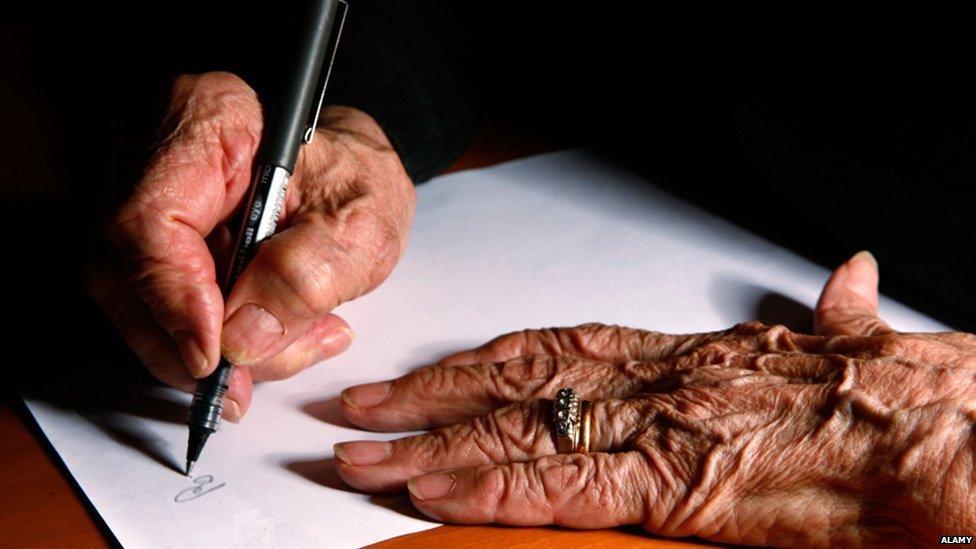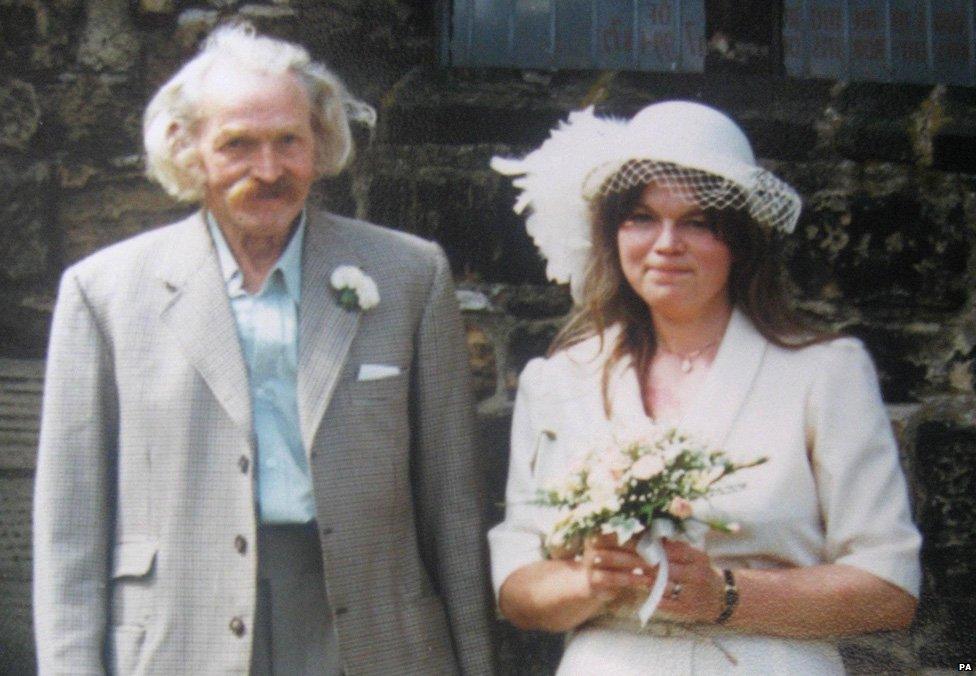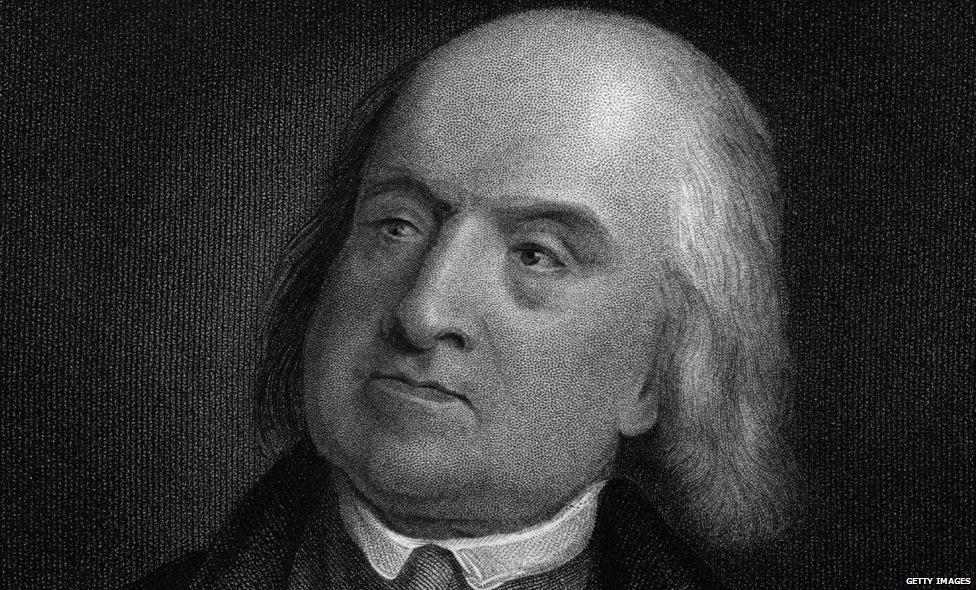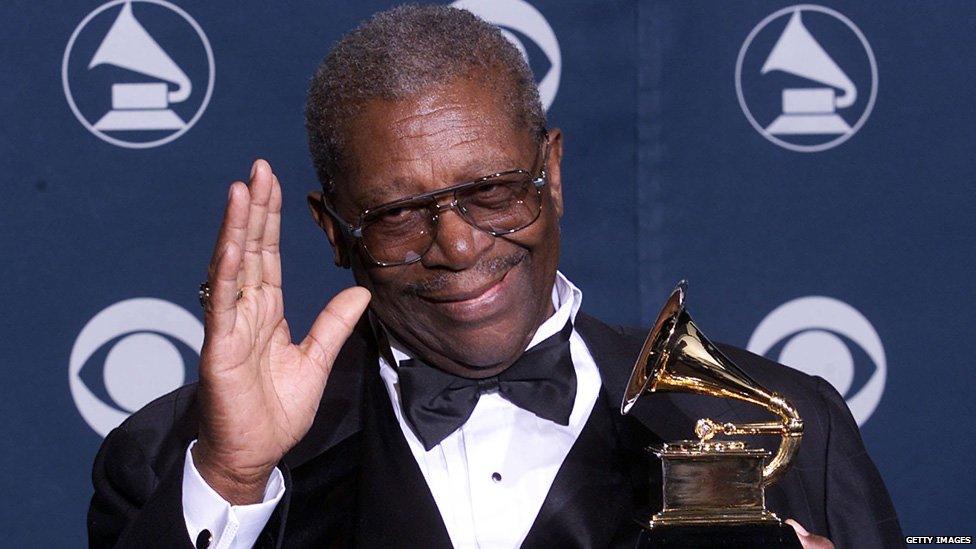Why do people disinherit their children?
- Published

A woman was awarded £164,000 after she was excluded from her mother's will. What drives a parent to disinherit a child?
Of all the ways to express disapproval of your offspring, leaving them out of your will is one of the bluntest.
You might bequeath your legacy instead to a dogs' home, or maybe a donkey sanctuary. In a wealth-driven society, it's about as powerful as gestures get.
And though it's rare, some parents really do feel strongly enough to insist their progeny get nothing whatsoever.
The Court of Appeal ruled Heather Ilot, 54, of Hertfordshire, should receive a third of her mother Melita Jackson's £486,000 estate, from which she had been deliberately omitted. Jackson never forgave Ilot for eloping at the age of 17. Instead, she left her wealth to the RSPCA, RSPB and Blue Cross animal charities.

Heather Ilot will receive a third of her mother Melita Jackson's £486,000 estate
It's a landmark ruling for England and Wales, which, like the United States, have a tradition of "testamentary freedom" - the idea being that you can, in theory and subject to the Inheritance Act 1975, external, leave your wealth to whoever you like.
Countries like France, Spain and the Republic of Ireland, by contrast, have fixed heirship shares. In Scotland, children and spouses have "legal rights" to a portion of the deceased's estate.
But where parents do have the opportunity to disinherit their children altogether, they occasionally do. And the resulting court battles invariably generate headlines.
There was Golda Bechal, a widow who died aged 89 leaving £10m, external to the owners of an Essex Chinese takeaway rather than her family. Australian socialite Valmai Roche, external left her daughters $1.50 (70p) each from her £3.5m (£1.64m) fortune. Florida heiress Gail Posner, external left her estate, including a $8.3m (£5.3m) Miami Beach mansion and a $3m (£1.9) trust fund, to her three pet Chihuahuas while her son received just $600,000 (£385,000).
Sometimes children have been estranged from their families. There may have been a row or a schism. On the other hand, relatives often claim the deceased has been taken advantage of while elderly and confused by unscrupulous interlopers.
On other occasions, it's a mystery. Christine Gill says she has no idea why she was written out of her parents' will.
Her father John died in 1999 and, after the death of her mother Joyce in 2006, Gill learned they had left their North Yorkshire farm to each other and then to the RSPCA.

John Gill with his daughter Dr Christine Gill on her wedding day
She had helped on the land since she was a teenager, bought an adjoining property so she could carry on doing chores and cared for Joyce, who had a range of phobias and did not like leaving the house.
The discovery came as a huge shock. "It's not so much that you're not going to get the money. It's that you live your life thinking there's a human connection and you love each other," says Gill, 65, a retired Leeds University lecturer.
She successfully challenged her mother's will in court, arguing that her "domineering" father coerced Joyce into making it. But the reason why John excluded her remains a mystery to Gill.
Lawyers who deal with these kinds of cases regularly say there's no single factor that drives people to disinherit their offspring.

What the law says
The law in England and Wales allows people to leave their estate to whomever they wish, but the Inheritance Act of 1975, external allows certain people to make a claim against an estate, for example a dependent child
In Scotland, a spouse or child cannot be totally disinherited from an estate - each is entitled to a portion of the deceased's moveable estate, external
The law in France protects children from being disinherited, external - a portion of the deceased's estate, known as "la reserve" must be held for their children
Under German law, direct descendants are automatically entitled to a share of any estate, external

"It can be for a number of reasons," says Katie Brassington, head of the wills, trusts and probate team at solicitors Slater and Gordon. "It can be because of an argument or because of who they have married. It can also be because they have not renewed their will."
Others think their children should earn a living, external rather than rely on an inheritance. Sting recently said, external he would not be leaving his £180m fortune to his children: "They have to work." Historian Dan Snow and his wife, heiress Lady Edwina Grosvenor, have considered doing the same, external. Body Shop founder Anita Roddick's daughters supported, external her decision to cut them out of her will and leave her entire fortune to charity - both are successful businesswomen.
Some parents believe their offspring have already received quite enough cash from them during their lifetime, says Mark Keenan, a partner and expert in trust and succession disputes at Mishcon de Reya, who represented Gill. Occasionally, he says, there's an argument, the parent changes the will and then forgets about it - but a will made in a fit of pique is still valid nonetheless.
Sometimes there's a correlation between the abundance of riches and the likelihood of a family falling out.
"Wealth can sometimes bring greed and jealously - it often creates animosity and detachment within a family which reveals itself on the death of a parent or loved one," Keenan adds. "I have been in mediation with brothers and sisters who haven't met or spoken for years - they don't know each other, they have nothing in common other than a blood connection."
Rosemary (not her real name) took the painful decision to write her daughter out of her will. After Rosemary took out equity release on her home, her daughter was aggrieved, she says: "She was banking on funding her own retirement from the proceeds of my bungalow."
The pair haven't spoken for five years as a result, and Rosemary's estate will now go to the RNLI. "I've gone through the grieving process," she says. "I needed to leave the relationship for my own well-being. At the end of the day I don't think anyone else has a right to that money."
The jurist Jeremy Bentham said the power of parents to exercise discretion over wills existed "for the encouragement of virtue and the repression of vice in the bosom of their families". That is, it could be used to incentivise or penalise. Critics of testamentary freedom say it can also be used to coerce and control.

The Ilot ruling - made under section three of the 1975 Act, which says dependants have a right to a "reasonable financial provision" - has repercussions for good causes that have traditionally benefited from wills, Keenan believes. "It's a damaging decision for the charitable sector and I am sure they will be considering carefully whether to appeal," he says. People making wills might be "advised to reduce charitable legacies if there are children to reduce the risk of claims".
Experts say the ruling means children can still be disinherited, but any parents wishing to do so must explain why and demonstrate what connection they have to whoever they leave their money to instead.
Both Brassington and Keenan say they have seen an increase in challenges to wills over the past decade, partly as a result of rising property values, publicity around high-profile cases and people having a greater understanding of their rights.
But what haven't changed are the dynamics within families that cause schisms and splits, and for Gill that's a legacy she's keen to dispense with.
"I've long since dispensed with worrying about my father," she says. "I don't have a relationship with my parents any more."

More from the BBC

One week after the "King of Blues" BB King died, his estate was embroiled in a legal challenge lodged by his children against his long-time manager turned-executor, LaVerne Toney. The BBC's Sarah Fowler examined some of the more dramatic feuds that have taken place over the wills and legacies of well-known figures throughout the decades.

Subscribe to the BBC News Magazine's email newsletter, external to get articles sent to your inbox.